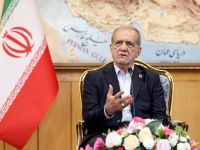The ISIS Twitter census: Defining and describing the population of ISIS (Daesh) supporters on Twitter
Although much ink has been spilled on ISIS’s activity on Twitter, very basic questions about the group’s social media strategy remain unanswered. In a new analysis paper, J.M. Berger and Jonathon Morgan answer fundamental questions about how many Twitter users support ISIS, who and where they are, and how they participate in its highly organized online activities.
Among the key findings:
• From September through December 2014, the authors estimate that at least 46,000 Twitter accounts were used by ISIS supporters, although not all of them were active at the same time.
• Typical ISIS supporters were located within the organization’s territories in Syria and Iraq, as well as in regions contested by ISIS. Hundreds of ISIS-supporting accounts sent tweets with location metadata embedded.
• Almost one in five ISIS supporters selected English as their primary language when using Twitter. Three quarters selected Arabic.
• ISIS-supporting accounts had an average of about 1,000 followers each, considerably higher than an ordinary Twitter user. ISIS-supporting accounts were also considerably more active than non-supporting users.
• A minimum of 1,000 ISIS-supporting accounts were suspended by Twitter between September and December 2014. Accounts that tweeted most often and had the most followers were most likely to be suspended.
• Much of ISIS’s social media success can be attributed to a relatively small group of hyperactive users, numbering between 500 and 2,000 accounts, which tweet in concentrated bursts of high volume.
Source: Brookings
Isn’t it time for a legal reform that brings more justice to divorced Jordanian women?
On 16 March 2015, one of the most prominent Arab female journalists, Rula Amin, was arrested in Amman in relation to the custody of her five-year old daughter. She was released the following day after a widespread public outrage both nationally, regionally and internationally, Nisreen Alami writes.
The reasons behind the outrage were not simply concern for the wellbeing of a child, or the empathy with the rights of a divorced mother, but rather by the unusual handling of this case by the very institutions mandated to safeguard the rule of law and protect the rights of citizens. It turns out that the appeal of “expedient custody” court decisions is illegal and contradicts with Jordanian law.
As I was following this case since August 2013, I was always astonished by the lack of accountability in our shari’a court systems. I was shocked to see that judges have unquestioned authority even in cases where they intentionally or unintentionally misrepresent the law. It is evident to me that despite significant reforms of the Jordanian personal status law, these reforms will always be lacking and meaningless if they do not include oversight and accountability mechanisms that protect women from discriminatory practices, or misjudgments. Our progress in ensuring a personal status law that is more fair to women will be of no value if it does not address two key elements: firstly, the issue of oversight and accountability, and secondly, the recognition of the existence of discriminatory and patriarchal values amongst many of the “all male” judges and junior officials in our shari’a courts. A visit to any shari’a court in Jordan will be sufficient to demonstrate the thousands of injustices and humiliation that women face on a daily basis on issues affecting their children, their families and their rights.
Source: 7iber
The emerging military dimension to the Qatari-Turkish relationship
A newly signed military agreement between Qatar and Turkey allows for the usual joint training, joint military drills, and is a boost for the Turkish arms exporting industry, but it interestingly allows for the deployment of Turkish troops to Qatar and vice versa.
Firstly, Qatar and Turkey have grown increasingly close in recent years, united by their approach to the politics of the Middle East as the Arab Spring took off and still as it now dissipates. In short, they both believe that the inclusion of moderate Islamist political actors in the regions affairs is crucial to the longer-term viability of the new polities.
Secondly, Qatar is looking for more military support options. All of the Arab states in the Persian Gulf region are nervous as to the longer term implications of not only the US-Iranian nuclear negotiations, but the US pivot to Asia. Thirdly, the Middle East is once again convulsing to civil war and strife.
In the face of these challenges, there is a whiff of an emerging desire to build meaningful, professional, capable militaries in the Gulf region. This stands in contrast with the classical Gulf military model, which was rich in equipment, but poor in training, maintenance, and overall capability. It remains to be seen whether this Qatari-Turkish agreement will be a part of this new trend, of building up domestic capacity in a meaningful way, or it will be an alliance of the old school, with a Gulf state seeking military agreements with an extra-regional power to shore-up their security.
Source: The Gulf Blog






